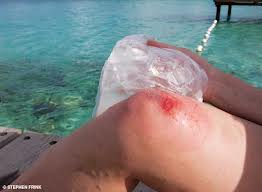Entertainment, News, Celebrity, Promoting, Fashion, Sport, Gossip, Politics, Events.
Tuesday, May 28, 2013
How to treat infected wounds
Undoubtedly, typical signs of infected wound include swelling, pain, fever, and the presence of pus. But absence of these signs does not mean the wound is not infected. According to experts, unless a wound is very recent, you should assume that untreated wounds are likely infected or may become infected.
This is why it is important to treat open wounds as soon as possible to prevent further damage to the wound. Open wounds can lead to serious infection, which can in turn lead to other complicated medical problems. Understanding correct wound care treatments is necessary to prevent further damage to the wound or infection to the wounded area.
Infected wounds should be treated by a physician or other medical expert. When that is not immediately possible, there are steps you can take to care for the wound until you are able to contact medical personnel.
Good sanitation is very important when dealing with any wound and is a necessary part of infected wound care. Make sure your hands are clean before tending to the wound and use only sterile
Instructions:
Wash your hands carefully before treating the infected wound. Be sure to clean beneath your fingernails and use antiseptic soap if available. After sanitising your hands, put on clean exam gloves if gloves are available. Sanitise the area of skin around the wound with alcohol or an antibacterial solution. Cleaning areas of skin near the wound site will prevent accidental contamination of the wound by any harmful bacteria present on the skin.
Carefully wash any foreign matter and pus from the wound. Avoid scrubbing the wound. Scrubbing may open blood vessels, allowing bacteria to enter the bloodstream. It is better to simply pour water over the wound to wash out debris.
Place antibiotic ointment, or an antiseptic solution, on sterile gauze and apply to the wound. Secure the gauze to the wound and try to keep the bandage clean. Bandages may need to be changed frequently.Seek professional medical attention for the wound as soon as possible. Infections can get serious very quickly.
Tips and warnings:
A tetanus shot may be necessary for those who have not had a tetanus shot in the past few years. Make sure the bandage is not too tight and check it frequently. Keep bandages dry. Seek medical attention immediately for infected large wounds or any wound.
If there is an increase in swelling of the wound, or you see redness spreading out from the wound, or fever is present, this may be a medical emergency. Seek immediate medical attention. Do not use hydrogen peroxide on serious and deep wounds. Hydrogen peroxide can destroy tissue and delay healing. Do not close an infected wound to avoid life-threatening infections.
Subscribe to:
Post Comments (Atom)

No comments:
Post a Comment